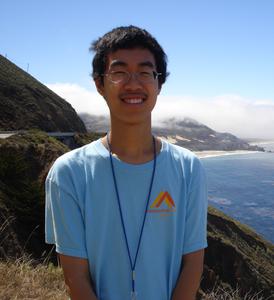Splash Biography
HOLDEN LEE, Princeton grad student in math
|
Major: Math College/Employer: Princeton Year of Graduation: G |

|
Brief Biographical Sketch:
Holden is a grad student studying the math behind machine learning algorithms. He enjoys writing stories, playing DDR, biking, listening to podcasts, rambling, cooking with friends at his co-op (2D), improvisation, speaking Esperanto, watching My Little Pony, talking to himself, taking copious notes on everything, and being rational but not too rational. Past Classes(Clicking a class title will bring you to the course's section of the corresponding course catalog)H543: toki pona in Splash Spring 2019 (Apr. 27, 2019)
toki - language; to talk, to speak
pona - good, simple
Toki pona is said to be the smallest language in the world, with just 123 words. Inspired by Taoist philosophy and the Sapir-Whorf hypothesis (language influences thinking), Sonja Lang created the language in 2001 as an experiment: what happens if we boil language down to the bare essentials? Come take part in this experiment!
For inspiration, check out this podcast episode: https://www.theallusionist.org/allusionist/tokipona
I will follow this course: http://tokipona.net/tp/janpije/okamasona.php
H495: Esperanto in Splash Spring 2018 (Apr. 21, 2018)
Saluton, amiko! (Hello, friend!)
Esperanto is the most successful constructed language in the world today. Its creator, Ludwik Zamenhof, designed the language to be easy to learn for everyone, and with the hope that it would foster friendship among people of different ethnicities. Because of its simple grammar and systematic vocabulary, it's estimated that a person can become fluent in Esperanto in 1/10 the time it takes to become fluent in English.
I'll give a first lesson in the language, as well as discuss the vibrant history, culture, and ideology behind Esperanto.
H501: toki pona in Splash Spring 2018 (Apr. 21, 2018)
toki - language; to talk, to speak
pona - good, simple
Toki pona is said to be the smallest language in the world, with just 123 words. Inspired by Taoist philosophy and the Sapir-Whorf hypothesis (language influences thinking), Sonja Lang created the language in 2001 as an experiment: what happens if we boil language down to the bare essentials? Come take part in this experiment!
For inspiration, check out this podcast episode: https://www.theallusionist.org/allusionist/tokipona
I will follow this course: http://tokipona.net/tp/janpije/okamasona.php
M373: Game programming with Elm in Splash Spring 16 (Apr. 30, 2016)
I'll introduce the basics of functional reactive programming - a new programming paradigm that combines the mathematical elegance of functions with effective signal handling to make programming games (and much more) clean and efficient. (In fact, Elm has been called the "happiest" programming language.*) Then you'll spend the rest of the time designing and implementing your own games, and I'll be on hand to assist throughout the process.
Come with ideas! See some examples at http://elm-lang.org/
*Reference: http://bit.ly/1BDFJFX
(Note: please do not come for just the second half.)
M381: Hands-on game theory in Splash Spring 16 (Apr. 30, 2016)
In this class you'll play some "games" with simple rules but counter-intuitive strategies and outcomes. Win a dollar... or not. You'll learn how these simple games are the beginnings of game theory, a branch of applied mathematics that arose in the 1900's and has had profound implications for diverse fields such as economics, psychology, and evolutionary biology.
M253: Game programming with Elm in Splash Spring 15 (Apr. 25, 2015)
I'll introduce the basics of functional reactive programming - a new programming paradigm that combines the mathematical elegance of functions with effective signal handling to make programming games (and much more) clean and efficient. (In fact, Elm has been called the "happiest" programming language.*) Then you'll spend the rest of the time designing and implementing your own games, and I'll be on hand to assist throughout the process.
Come with ideas! See some examples at http://elm-lang.org/
*Reference: http://bit.ly/1BDFJFX
|
|
